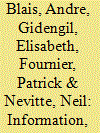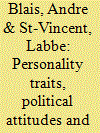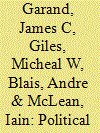|
|
|
Sort Order |
|
|
|
Items / Page
|
|
|
|
|
|
|
| Srl | Item |
| 1 |
ID:
110628


|
|
|
|
|
| Publication |
2011.
|
| Summary/Abstract |
We propose an experimental design particularly adapted to the study of individual behavior in collective action situations. The experimental protocol improves on the artificiality that is commonly present in lab and survey experiments to achieve a closer replication of the real-life conditions of such decisions while avoiding the high costs associated with field experiments. We exemplify this design by means of a study on strategic voting in elections.
|
|
|
|
|
|
|
|
|
|
|
|
|
|
|
|
| 2 |
ID:
086766


|
|
|
|
|
| Publication |
2009.
|
| Summary/Abstract |
This article assesses the aggregate effect of information shortfall on the outcome of the last six Canadian elections. Building on Bartels' analysis, the authors find an information effect in three of the six elections examined, and in each case the information gap benefits the Liberal Party. That finding raises the question: why does information matter in some contexts but not in others? It is argued in this article that the information gap is related to lack of visibility. When and where all political parties have some degree of visibility, the less informed vote like the better informed, but when and where a party is hardly visible, the less informed are less likely to support that party. The less informed appear to consider a smaller set of options when they decide how to vote.
|
|
|
|
|
|
|
|
|
|
|
|
|
|
|
|
| 3 |
ID:
171352


|
|
|
|
|
| Summary/Abstract |
It is widely assumed that celebrities are imbued with political capital and the power to move opinion. To understand the sources of that capital in the specific domain of sports celebrity, we investigate the popularity of global soccer superstars. Specifically, we examine players’ success in the Ballon d’Or—the most high-profile contest to select the world’s best player. Based on historical election results as well as an original survey of soccer fans, we find that certain kinds of players are significantly more likely to win the Ballon d’Or. Moreover, we detect an increasing concentration of votes on these kinds of players over time, suggesting a clear and growing hierarchy in the competition for soccer celebrity. Further analyses of support for the world’s two best players in 2016 (Lionel Messi and Cristiano Ronaldo) show that, if properly adapted, political science concepts like partisanship have conceptual and empirical leverage in ostensibly non-political contests.
|
|
|
|
|
|
|
|
|
|
|
|
|
|
|
|
| 4 |
ID:
103362


|
|
|
|
|
| Publication |
2011.
|
| Summary/Abstract |
This article examines the link between personality traits, political attitudes and the propensity to vote in elections, using an Internet panel survey conducted in two Canadian provinces at the time of the 2008 federal election and the subsequent provincial elections. It first establishes that the two most proximate attitudes that shape one's propensity to vote are political interest and sense of civic duty. The article then look at specific personality traits (altruism, shyness, efficacy and conflict avoidance) that could affect level of political interest, civic duty and the propensity to vote in elections. In the last part of the analysis, a model is proposed and tested, according to which the impact of personality traits is indirect, being mediated by interest and duty. The article shows that the data are consistent with such an interpretation.
|
|
|
|
|
|
|
|
|
|
|
|
|
|
|
|
| 5 |
ID:
098240


|
|
|
| 6 |
ID:
121627


|
|
|
|
|
| Publication |
2013.
|
| Summary/Abstract |
This article reports on an Internet-based quasi-experiment that took place during the French 2012 presidential election. We designed a website where French voters could vote under different voting rules. Based on the observation of more than 8,000 participants, we find that a substantial minority (10% to 15%) vote differently under the different systems, with 17% of the voters not voting for their preferred candidate in the one-round election, this percentage dropped to 12% in the alternative vote (first choice). Compared to the two-rounds election, at the aggregate level, the top two candidates get slightly more votes under one round, while the minor candidates obtain more first choices under the alternative vote. These findings are consistent with what the literature suggests about the impact of these voting systems on voters' choice.
|
|
|
|
|
|
|
|
|
|
|
|
|
|
|
|
|
|
|
|
|